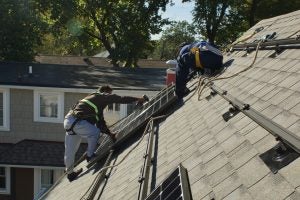Net metering in Virginia
What is net metering?
Net metering is the policy that allows people with solar to get a credit on their electric bill for the energy they produce from their system.
Net metering in Virginia
| System capacity limit | Residential: 25 kW Non-residential : 3,000 kW Agricultural: 500 kW (aggregated capacity) |
| Monthly excess generation credit rate | Full retail |
| Annual excess generation credit rate | Avoided cost |
| State-wide net metering cap for Investor Owned Utilities (Dominion & APCO) | Six percent of utility’s peak-load from previous year (including 1% Low-to-Middle-Income carve out) |
| State-wide net metering cap for electric cooperative utilities | Seven percent of utility’s peak-load from previous year |
| Policies expanding net metering | Aggregate net metering for farmers |
| Additional barriers | Standby charges for residential systems greater than 15 kW |
Billing and compensation
 Virginia’s residential customers are compensated at a one-to-one retail rate for the solar energy they output to the electric grid if their system size is less than 25 kW. Commercial or other non-residential customers are compensated at one-to-one retail rate with a system size limit of 3,000 kW. In Virginia, systems are typically sized to not exceed a customer’s annual consumption. In some cases (depending on utility rules), a customer may over-size a system for the future purchase of an electric vehicle or other beneficial electrification. However, if a customer generates too much solar energy over the course of a 12-month period, the customer can roll over the credit or receive a payment at the avoided cost rate.
Virginia’s residential customers are compensated at a one-to-one retail rate for the solar energy they output to the electric grid if their system size is less than 25 kW. Commercial or other non-residential customers are compensated at one-to-one retail rate with a system size limit of 3,000 kW. In Virginia, systems are typically sized to not exceed a customer’s annual consumption. In some cases (depending on utility rules), a customer may over-size a system for the future purchase of an electric vehicle or other beneficial electrification. However, if a customer generates too much solar energy over the course of a 12-month period, the customer can roll over the credit or receive a payment at the avoided cost rate.
Standby charges
Residential systems greater than 15 kW (AC rating) in Dominion Energy territory are subject to standby charges. The amount of the charges will depend on the amount of peak power demand used on site. Additionally, Dominion Energy customers with systems greater than 15 kW and less than 25 kW are subject to these additional transmission and distribution standby charges. Appalachian Power (APCo) and electric cooperative customers are not subject to demand charges.
Other types of net metering in Virginia
- Aggregate net metering: Virginia farmers can participate in aggregate net metering in which excess solar production from one meter or building is credited to another.
- Virtual net metering: Virtual net metering for either community solar or tenant aggregation will soon be available for some Virginia solar customers (as of August 2020). While Dominion has a program that is called community solar, the program does not allow individuals to own or develop their own shared solar facilities. Learn more about community solar.
Take action
Sign the Virginia Declaration of Solar RightsVirginia utilities shouldn’t be able to limit our ability to go solar. Yet they have actively lobbied to impose arbitrary and technically unsound limits on net metering limiting customer options. Sign the Virginia Declaration of Solar Rights and help expand net metering in the state. |
Get help from fellow solar ownersIf you’re having trouble with net metering or getting your system interconnected, join us as a Basic Member (free) and access our Virginia listserv where you can post about your problem and get help.
|
File a complaintOur utilities exist to serve their customers. If you’re having a problem that isn’t being resolved quickly by your utility, file a complaint at the State Corporation Commission.
|
Virginia resources
Net metering and your utility
- Dominion Energy
- Shenandoah Valley Electric Cooperative
- Rappahannock Electric Cooperative
- Northern Virginia Electric Cooperative
- Southside Electric Cooperative
Our recent work on net metering in Virginia
Solar United Neighbors was part of a coalition that passed the Virginia Clean Economy Act in 2020 that increased net metering caps, expanded system size limits, limited unfair system charges, and more. Read more about updates to solar laws in Eight ways new Virginia laws help you go solar.
Our past work included thousands of signatures on a state-wide Declaration of Solar Rights that demands the Virginia general assembly remove interconnection standby charges, arbitrary caps on solar generation and other policies that prevent all Virginians from accessing and being fairly compensated for solar energy.
Additional policy resources for Virginia
- Power for the People VA blog – This is an excellent resource summarizing all solar and renewable energy policy developments in Virginia.
- Virginia Distributed Solar Alliance – This is a diverse group of individuals and representatives from grassroots organizations, industry, financial, and legal institutions throughout the Commonwealth, that share a common vision in which all Virginia communities can benefit from the energy choice, job creation and grid resilience inherent in solar distributed generation.
